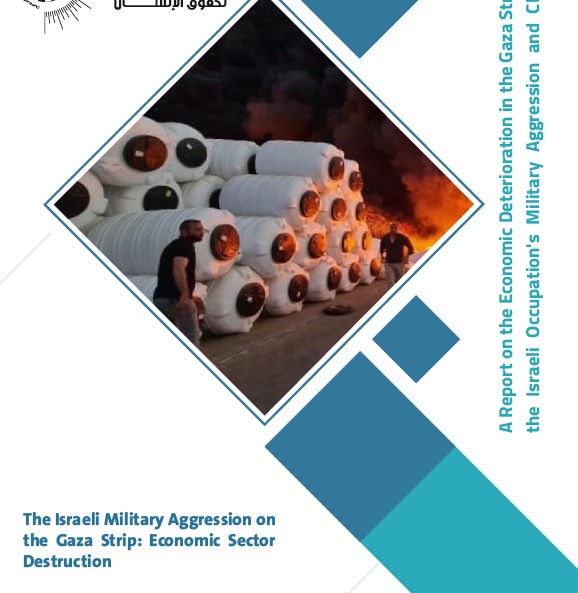
Red: 51/2021Date: 28 September 2021 On Tuesday, 28 September 2021, the Palestinian Centre for Human Rights launched report: “Israeli Military Aggression on the Gaza Strip: Economic Sector Destruction,” that addresses the Israeli occupation forces’ (IOF) attacks on economic establishments such as factories, vocational workshops, shops, tourist facilities, as well as agricultural lands; exacerbating the fragility of the Gaza economic conditions and worsening the hardships of the sector operating under a 15-year Israeli closure.The report documented that 2,134 economic establishments were systematically destroyed during the 11-day military aggression, of which 450 were totally destroyed, 270 sustained substantial partial damage and 1,414 were partially damaged. The affected facilities according to the economic sector were distributed as follows: 302 facilities within the industrial sector, 1120 facilities within the commercial sector and 712 facilities within the service-providing sector. According to initial data, the direct damage to buildings and property were estimated at 74.2 million dollars, as per data obtained by PCHR from the Ministry of National Economy.The report demonstrates that all economic sectors were affected during the aggression, as the economy came to a standstill, due to the lack of access to economic facilities, which led to a decrease in GDP by about $75.8 million compared to last year, a 3% drop. This serious deterioration worsened the dire situation of economic establishments that lost almost 50% of their operational capacity before the aggression due to the Israeli closure policy and restrictions on exports and imports to and from the Gaza Strip.The report also reviews the impact of the tightening closure and economic strangulation policy on the Gaza Strip, and the imposition of restrictions on exports and imports after the end of the aggression on the performance of economic establishments that were not destroyed during the aggression and continue to operate at low capacity. These restrictions have accelerated the deterioration of economic and social conditions in the Gaza Strip, and affected all economic sectors, especially factories, due to the decrease in the stock of goods and various raw materials necessary for the operation of these facilities. The report also shows that Kerm Abu Salem, Gaza’s only commercial crossing, operated partially for the 3-month period after the aggression, as an only 30% entry rate was recorded of basic goods compared to pre-aggression numbers.The report shows that there are hundreds of economic establishments that were destroyed during the 2014 Israeli military operation on Gaza were neither reconstructed nor were their owners compensated for the loss they incurred. To date there are 1,033 destroyed economic establishments that await reconstruction; as the vast majority of these establishments were not compensated for damages. A less than 7% of estimated damages value was offered in financial aid to damaged economic establishments. Consequently, the long-term impact on unemployment and poverty rates in Gaza was substantial with the rates growing to 45% unemployment and 63% poverty.The report concluded with recommendations that included immediate reconstruction of economic facilities to save the struggling Gaza economy and halt the spike in poverty and unemployment rates. The report also demanded neutralization of civilian objects, including industrial and economic establishments, from military operations, as per all international laws. The report also issued a call to the High Contacting Parties to the Fourth Geneva Convention to pressure the Israeli occupation authorities to lift all form of the unjust closure immediately, to ensure fast entry of construction materials, in a manner that responds to the drastic needs created by the devastating damage caused by the military aggression, and to allow the export of goods from the Gaza Strip.